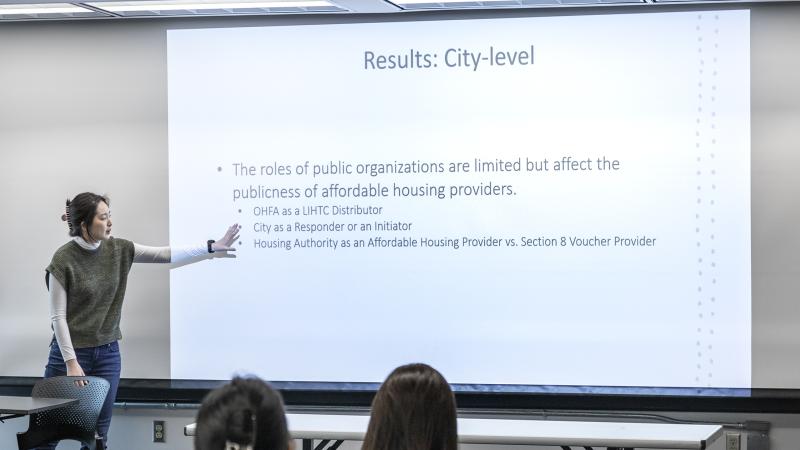Colloquium: Scholarship in the Round
For city and regional planning doctoral students, the section’s colloquium is as much a part of the program’s culture as it is the curriculum. The one-hour credit course offers doctoral students, Knowlton School planning faculty, and scholars from outside Knowlton the opportunity to share their research and engage in conversations of importance to the discipline and affiliated fields.
“As a student working on my dissertation, I often feel confined to certain topics relevant to my research,” said fourth-year PhD candidate Seungbin Park. “However, city and regional planning is essentially an interdisciplinary field, and I believe that one cannot fully succeed without being open to diverse subfields. The colloquium presents research on topics such as local and regional economic development, race and ethnicity issues, sustainability, transportation, food systems, and more, allowing me to stay informed about the diversity of contemporary research within the program.”
Presenters during this past spring semester included Dr. Zhenhua Chen, an associate professor in the planning section, who spoke about his group research project on resilience in transportation infrastructure; Kirwan Institute Executive Director Ange-Marie Hancock presented “Ending Anti-Black Racism through Community Co-Design in Los Angeles”; and doctoral candidate Aram Yang discussed her Columbus-based research on the roles of governance and organizations in affordable housing outcomes for low-income households.

Many PhD students attending the colloquium find that the presentations illuminate new paths of inquiry for their research. Park found PhD candidate Jeeson Oh’s presentation in Fall 2022 on philanthropic foundations' strategies and equitable practices in urban/downtown development projects instructive for his research on university partnerships and economic development. “While the context of Jeeson Oh’s research was not fully identical to mine, I saw similarities between universities and philanthropies in their emergence as key agents in urban development. Therefore, I got some hints from her research as to how I approach my research questions,” said Park.
While the topics presented this year did not directly align with first-year PhD candidate Saba Maleki’s research on noise pollution around airports, she responded to a theme that she felt connected many of the presenters’ research. “The speakers looked at different topics through various lenses, but equity was at the forefront of their discussions. I found it to be the most important takeaway from these sessions,” commented Maleki.
While the range of subjects is diverse and interdisciplinary within the colloquium, so too is the status of the research presented: some work is complete and published while other work is in a draft form. Mara Villaseca, a first-year PhD planning student, finds this compelling. “I think it is fascinating to see some of the work of our professors in its raw state. It is almost like having a rare chance to witness rough outlines as opposed to polished publications. The classroom dynamics facilitate substantial academic inquiry,” she said.

In addition to making connections among research projects or opening up new possibilities, students in the colloquium are offered the opportunity to study effective communication and hone their presentation skills. Maleki found that the way the scholars and PhD candidates presented their research projects and the way the audiences reacted to their presentations by asking questions—adding comments or sharing their thoughts—was a valuable experience. “As a first-year PhD student, it felt like an early exercise for me to develop my presentation skills and learn how to communicate my research effectively. These sessions provide students with an opportunity to observe and learn from experienced presenters, helping to reduce the stress of future presentations, and giving us new ideas to follow in our future research projects,” she said.


